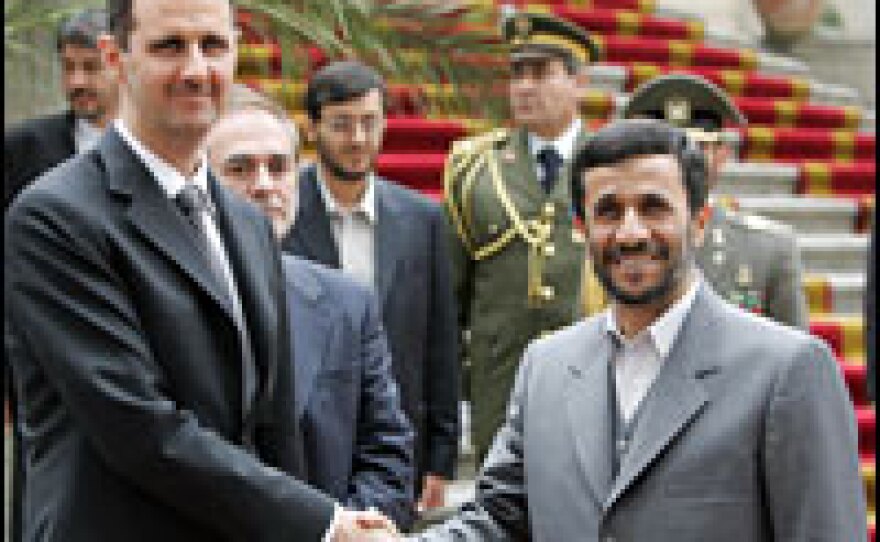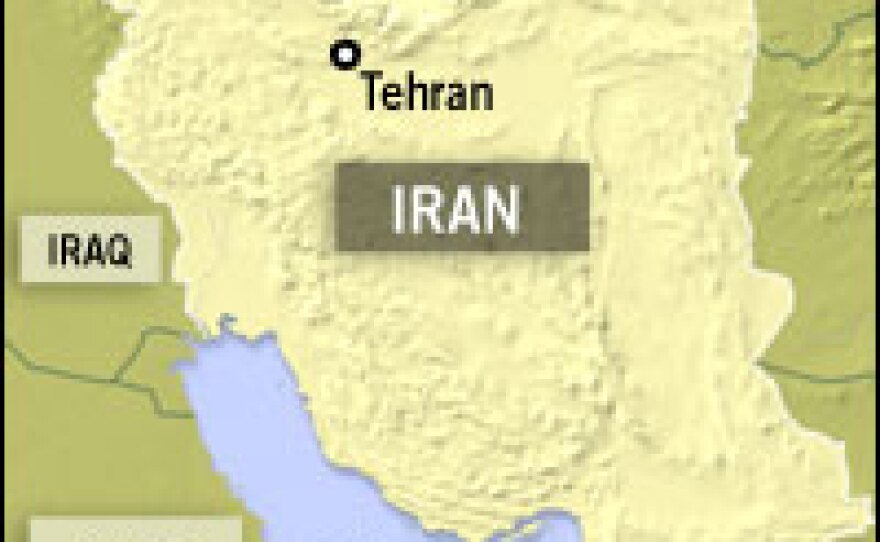

Over the last quarter-century, Iran and Syria have sustained a strong partnership, which many experts see as an odd coupling.
Syria is a secular regime and, in the 1980s, its army gunned down thousands of Islamist revolutionaries and jailed many more. Iran, on the other hand, touts revolution under the banner of Islam, according to Robert Malley of the International Crisis Group.
"It's unlikely at one level," Malley says. "I mean, there's one very secular and one very religious regime. One is Arab, one is Persian. One has negotiated with Israel, the other one has had no dealings with Israel. And, yet, they have found common interests and enemies, and that's what's made this relationship both intriguing and extremely solid."
Common Enemies
Officials in Damascus offer a list of reasons for the partnership, but they say that what it boils down to are common enemies.
"We believe that the American agenda in the Middle East — it's so dangerous for the people in the Middle East. Iran believes same. We believe that Israel is our enemy — this is exactly what Iran believes," says Mohammed Habash, head of the Iranian Syrian Friendship Committee in Parliament.
Common enemies have led to common economic interests, according to Abdullah Dardari, Syria's deputy prime minister for economic affairs.
"It's political and economics. Can you separate the two? Naturally, we have good political relations. Most of the businessmen who come from Iran are telling us they see a virgin land for investment," Dardari says.
Iran has poured about $3 billion into Syria for an oil refinery, a car factory and cooperation agreements for telecommunications, housing and agricultural projects.
Syrians, however, have never quite warmed to the alliance.
At a mosque in the center of the Syrian capital, crowds of Iranian pilgrims gather to visit a historic Shiite shrine, the women in long, black cloaks and the men chanting Shiite prayers with deep, public emotion.
More than one million Iranians visit every year, providing a huge boost for Syria's economy. But there are no Syrians at the shrine.
The two nations share no common language, and as for Islamic traditions, there is a deep divide.
Iranians are predominately Shiites while Syria's ruling elite is most Alawite, an offshoot of Shiite Islam. The vast majority of Syrians, however, are Sunni Muslims.
But for the past 25 years, their alliance has been cemented by a mutual suspicion and fear of neighboring Iraq.
"Saddam Hussein not only started a war against Iran, he was supporting anti-Syrian elements — the Muslim Brotherhood — here. So both regimes were threatened. They had to come together and be against Saddam Hussein," says Josh Landis, co-director of the Center for Peace Studies at the University of Oklahoma and assistant professor of Middle Eastern Studies in the School of International and Area Studies.
"It's a classic balance of power game. When Iraq is strong and threatens both countries, the two neighbors, Syria and Iran, have to come together and protect themselves," Landis says.
Re-Establishing Ties
The Iran-Syria alliance drifted apart in the 1990s when Saddam was weak, but Landis says that in 2003, Iraq became a threat again.
"As soon as America landed in Iraq in 2003 and said, 'I am going to blow apart both the Iranian and Syrian regimes and change the entire Middle East,' the relationship became strong again. And America was threatening both countries, so Iraq was strong," Landis explains.
But as the Iraq war dragged on, Iran became stronger, too. Oil prices were rising, and elections in Iraq brought to power a Shiite-dominated government friendly to Tehran. Iran began to challenge American influence in Iraq and around the region. Iran's partnership with Syria deepened again, according to Vali Nasr with the Council on Foreign Relations.
"It's the United States that's defined these two governments as an axis of trouble in the region," Nasr says.
The United States points to Lebanon as one example of that trouble, where Iran and Syria support Hezbollah. In Gaza, both countries back Hamas.
Nasr says Iran is the stronger partner, but Syria is important because Damascus is Iran's lone ally in the heart of the Arab world, where anti-American sentiments are strong.
"Iran is the driver. Syria is not the one who is on the barricades confronting the U.S., but Syria has decided or benefited from the fact that it's hitched its wagon to Iran," Nasr explains.
The End of an Alliance?
These days, the partnership remains strong, but as the two find themselves supporting opposing sides in Iraq's sectarian war, their decades-old alliance could come under strain.
In broad terms, Iran supports the Shiite-dominated government, but Syria, a predominantly Sunni country, sees interests with Iraq's Sunni minority, Nasr says.
"In fact, Syria is in many respects doing the dirty work of the Arab world in providing the actual physical support for the insurgency. When it comes to Iraq, Syria is aligned with the Arab world," Nasr says.
"So as soon as the U.S. leaves, Syria is going to want Sunnis to have more power. Iran is going to want Shiites to have more power, and they are going to fall out over this," Landis says.
Copyright 2022 NPR. To see more, visit https://www.npr.org. 9(MDAzMjM2NDYzMDEyMzc1Njk5NjAxNzY3OQ001))







